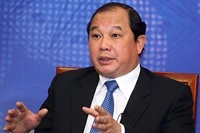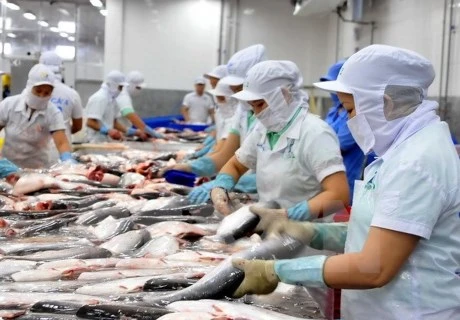Hanoi (VNA) - Businesses under the Ministry of Industry and Trade (MoIT) have not attracted foreign strategic investors during their equitisation, the ministry's board for enterprise renewal and development's deputy head Phan Dang Tuat said.
Tuat told a conference, held in Hanoi on December 24 to review the restructuring, privatisation and capital divestment of the ministry's firms in the 2011-15 period, that most of the strategic investors believed that their shareholding of less than 51 percent at State-owned enterprises (SOEs) could not make them feel at ease, as they could not control their investment.
As of the end of 2015, the ministry has completed privatisation and changed eight SOEs into joint stock companies according to the Law on Enterprise. In the 2011-15 period, 15 businesses were privatised, with only five firms under the ministry successfully attracting strategic investors. These five firms are the Vietnam National Textile and Garment Group (VINATEX), the Vietnam Vegetable Oils Industry Corporation (Vocarimex), the Vietnam Engine and Farming Machinery Corporation (VEAM) and the Vietnam Paper Corporation (Vinapimex), besides the Foodstuff and Technology Investment Corporation (Focosev).
The initial public offering of three corporations under the Vietnam National Coal and Mineral Industries Group (Vinacomin), with a total charter capital of 1 trillion VND (44.5 million USD), was not attractive to strategic investors as the state ownership at the corporations was high at 98 to 99 percent.
The divestment and privatisation at the Vietnam National Oil and Gas Group (PetroVietnam) were also lower than expected due to unfavourable factors in the markets, while the capital in its corporations was too large for strategic shareholders.
The Vietnam National Petroleum Group (Petrolimex) has prepared a plan to increase its charter capital by issuing shares to strategic investors of JX Nippon Oil and JX Minerals to reduce the state ownership to 65 percent.
Tuat said the divestment after the IPO also faced difficulties as foreign investors wanted transparent financial reports, which has been a shortcoming of many Vietnamese firms. Moreover, strategic investors need preferential mechanisms to ensure their investments.
"All the ministry's companies faced challenges in identifying a management model after the IPO. We could not apply old models in new companies after the IPO," he said.
The ministry said low power tariffs and business results made Power Generation Corporation 3 (Genco 3) the largest — in terms of capacity — of the three Gencos under Electricity of Vietnam that was unable to pay dividend to its shareholders, causing difficulties in its privatisation.
The requirement is that Genco 3's profits should be enough to pay dividend at seven to 10 percent a year to ensure successful privatisation.
The corporation was scheduled to separate from EVN. Power generation by EVN was to be 17 to 18 percent, while the remaining was to come from other companies this year.
However, the privatisation of Gencos in the 2014-15 period experienced difficulties due to low mobilisation of capital.
EVN General Director Dang Hoang An said Gencos were hard-pressed to find investors who would buy all the offered shares because of the large scale. In addition, it was difficult for them to find jobs for labourers after privatisation.
Minister Vu Huy Hoang said the divestment and privatisation process in the ministry's businesses saw important results.
However, the objective impacts from the securities market as well as businesses' difficulties in clarifying their value in terms of finance, debts, land and assets made the process go slow.-VNA

























